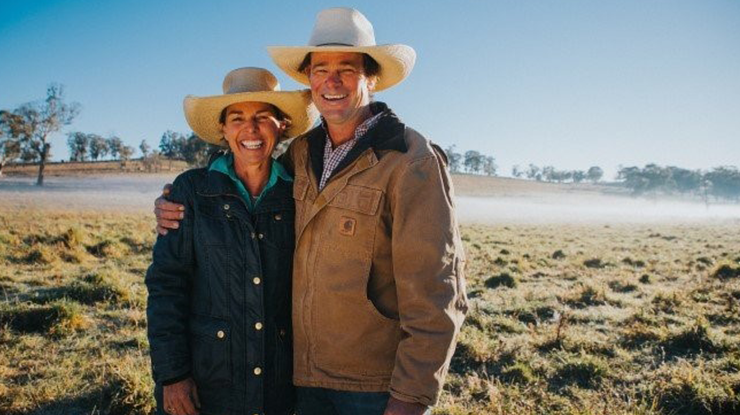 Erica and Stu Halliday, Beef Producers, Walcha NSW
Erica and Stu Halliday, Beef Producers, Walcha NSW
Red meat producers are featuring in a series of new videos, sharing their stories to inform consumers on how red meat is produced in Australia.
Produced by Meat & Livestock Australia's (MLA) community engagement platform, Australian Good Meat, the videos profile red meat producers from across the country and will be rolled out on social media and digital platforms to demonstrate how caring for animals, the land and the environment is at the heart of everything they do and crucial to managing a successful farm.
The first three videos feature the stories of Erica and Stuart Halliday from Walcha NSW, Stuart Austin from Willmott Cattle Co in Ebor NSW, and Melinee Leather from Banana QLD.
MLA Managing Director, Jason Strong, said the videos support the evolving expectations of consumers and the community, who want a greater understanding of where their food comes from and how it's produced.
"The videos transport viewers to the farms of red meat producers as they explain how they take great pride in their thriving environment, healthy ecosystems and good animal welfare practices," Mr Strong said.
"MLA's work around positioning red meat in the marketplace forms a critical part of our Strategic Plan. There continue to be plenty of misconceptions about how red meat is produced in Australia, when in reality our industry has proven to be a world leader in sustainability and animal welfare practices and continues to produce quality red meat that is natural and full of essential nutrients. We just need to get better at telling our story because if we don't, someone less informed will."
Mr Strong said while the main aim of the videos was to provide information to consumers via digital and social channels, MLA has also produced 'longer form versions' aimed at other red meat producers to encourage practice change on-farm.
"The long videos are focused on research adoption and will be shared through MLA's red meat producer-facing channels. Importantly, they demonstrate the tools and practice change being implemented on farms across Australia around animal husbandry and welfare, natural capital, biodiversity and drought resilience, and carbon emissions and sequestration, all with the aim of driving greater productivity," Mr Strong said.
Erica and Stu Halliday, Walcha
For fifth generation Walcha beef graziers Erica and Stu Halliday leaving the land in a better state for the next generation drives their passion and commitment to regenerative change.
"We are working to increase soil carbon through a combination of new pastures varieties and rotational grazing and are on-track to be carbon neutral before 2030," they said.
"Through our regenerative on-farm practices we are working to go beyond carbon neutrality to be a net carbon sink, using plants and livestock to sequester carbon from the atmosphere and put it back into the soil.
"We were really happy to open our farm gate and let the community see what we do and how their food is produced. Taking part in the video shoot was a fun experience and we would encourage other producers who are interested in being advocates for their industry to be involved."
Stuart Austin, Wilmot Cattle Co.
For Stuart Austin of Wilmot Cattle Co, a shift in grazing management was instrumental to turning their beef production business around. As a result, it has become a more ecologically and financially resilient business.
"We can demonstrate through our production system that we are massively carbon positive. By soil carbon sequestration we are taking GHG out of the atmosphere and storing them in our soils. We're sequestering an enormous amount more than we're admitting every year all while producing the most nutrient dense beef that a person could eat," Stuart said.
"In managing our grazing in the way that we do, we are restoring the health of our soil and the health of this landscape. Our ecological health is improving on this farm, and we've got all the data to demonstrate that that's the case.
"I've got no qualms showing anyone around our farm and explaining everything we do."
Melinee Leather, Banana
Central QLD organic and humane certified beef producer's Melinee and Robert Leather are passionate about animal wellbeing and natural grass-fed beef.
"It's important for us to have a really healthy environment for our cattle, so we're constantly considering the health of our pastures and our soils and introducing any kind of legumes we can to enhance that even further," Melinee said.
"We use leucaena because it's one of the most sustainable legumes available, it's high in protein and helps us to reach our carbon neutral goals by reducing methane emissions by around 20-40% while the woody vegetation sequesters carbon as part of the natural cycle.
"We're a family run business and always thinking about how we set the property up for long-term sustainability. We constantly have to be willing to change as time goes on and an important part of that is listening to our consumers and meeting their expectations."
To view the videos and meet the producers, visit the Australian Good Meat website. Follow Good Meat on Instagram and Facebook to share these videos with your network.






